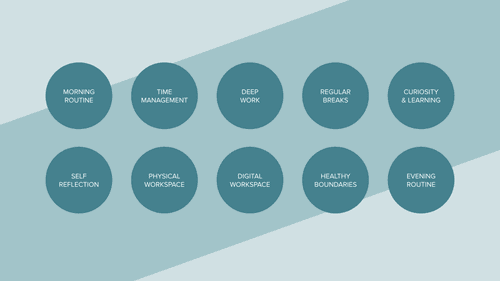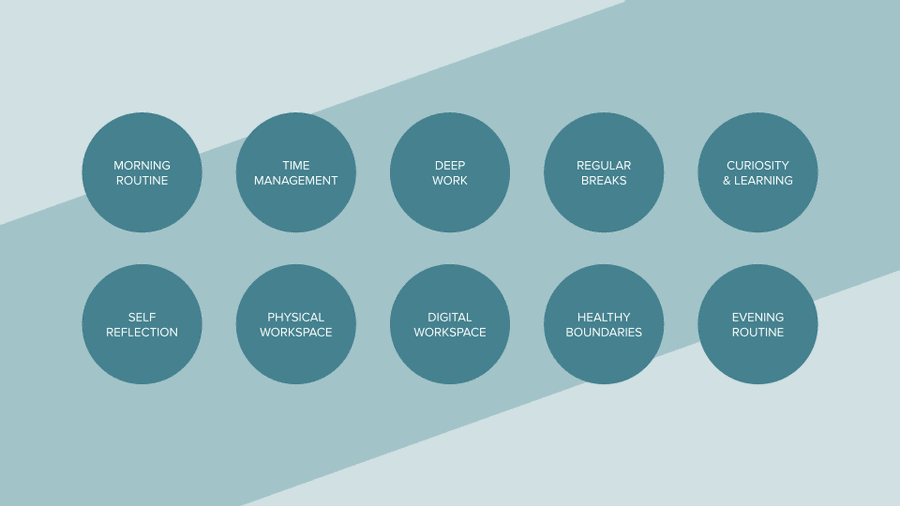Mindful productivity audit: 10 questions to improve your well-being at work
Curated from: nesslabs.com
Ideas, facts & insights covering these topics:
11 ideas
·7.06K reads
89
Explore the World's Best Ideas
Join today and uncover 100+ curated journeys from 50+ topics. Unlock access to our mobile app with extensive features.
Assessing your productivity
A huge number of productivity books have been published but very few of these books combine productivity, creativity, and mental health. How do you achieve more without burning out in the process?
Using a mindful productivity audit is one way to assess your current systems and evaluate if you can perform better while taking care of your mind.
190
1.82K reads
The first thing you do in the morning
The first hour is the most important part of your day. It impacts your mindset by setting the tone for the rest of the day. A routine designed around your goals will always trump one that is based on habits you haven't thought about.
- What is the first thing you do in the morning? Write it down. Be as detailed as possible: getting up, brushing your teeth... until you sit down at your desk.
- What could be improved?
- Do you have any bad habits you want to better manage?
222
875 reads
How to manage your calendar
A calendar is a helpful tool to manage your time. It is there to guide you, not to rule you.
Review a typical week in your calendar.
- How many events are there?
- How many events did you create, and how many invitations did you receive?
- Could any of these meetings have been replaced by email or a shared document?
Start exploring ways to improve your time management systems. It might be useful to block some time at the start of the day to adjust your calendar.
181
620 reads
How much time to dedicate to deep work
Research suggests a knowledge worker should spend four hours of deep creative, highly productive work per day.
How many hours do you currently dedicate to deep work? Look at your calendar and count the hours spent in deep work.
If you have too many hours, try to unblock some time for lighter work or recharging your mental energy. If you have too few, try and rearrange your time commitments to make space for up to four hours of deep work per day.
192
660 reads
How many break to take during a day
Taking breaks restore your motivation, consolidate your memory, increase your creativity, and prevent decision fatigue. Research suggests we need to take a break for 5 to 10 minutes every hour or so and a longer break (more than 30 minutes) every two to four hours.
Look at your calendar, and ensure you have a combination of short and long breaks during the day. During a break, move your body, do some deep breathing, chat with your peers, or go for a walk outside.
194
587 reads
How to cultivate curiosity
When we have lots of work, we can fall into the trap of neglecting to nourish our mind with enough high-quality input. Ways to cultivate curiosity include reading books, blogs, newsletters, taking online courses, joining learning communities, and more.
- Do you make space for cultivating your curiosity, exploring new ideas, and expanding your knowledge?
- Make a list of all the ways you cultivate your curiosity. Consider if these opportunities are aligned with your goals.
188
478 reads
Create space for self-reflection
Instead of mindlessly repeating the same action with little regard for how they impact your performance, ensure you have time and space to reflect and incrementally improve the way you work.
A weekly review is a powerful way to direct your life with intention. It may be in the form of journaling. Include questions to assess what is going well, what is difficult, and what your focus should be during the following week.
194
422 reads
Consider your physical workspace
Your working space can have an impact on your productivity. When working from home, are you crouching on the kitchen table or working from your sofa?
Ask yourself:
Is my chair is comfortable?
What is my posture when I am sitting?
Is the screen at eye level?
Do I get enough light?
Do I have access to liquids to stay hydrated throughout the day?
Do I enjoy my workspace?
185
403 reads
Consider your digital workspace
It is easy for knowledge workers to accumulate screenshots and random files on their computer "just in case". Performing an audit of your digital workspace can reduce your cognitive load.
- What does your desktop currently look like?
- What apps are installed? Which ones do you regularly use?
- What tools do you use to manage your knowledge?
- Take some time to consolidate, declutter and clean up the files on your computer. Explore potential tools for thought, such as a note-taking app.
187
346 reads
Determine when to stop working
People working from home can be tempted to keep working until they feel too tired to keep going.
Creating habits, routines and rituals to frame your workday is essential for sustainable performance.
- Create a hard stop at a specific time.
- Another approach is to give yourself a specific number of work hours per day, which is more flexible as you can start and stop earlier or later.
- Shift your focus from time to actual productivity by creating an adequate list of tasks for the day. Once the tasks are done, you are done.
181
344 reads
The last hour of the day
Winding down before you go to bed will help you sleep better and prepare your mind for the next day.
Write down everything you usually do in the last hour of a typical day. How many activities involve a screen? Do you spend time with your family? Do you read a book? Do you think you have bad habits in the evening?
Consider what you want to change and implement it in your evening routine.
194
507 reads
IDEAS CURATED BY
Milo 's ideas are part of this journey:
Learn more about timemanagement with this collection
Understanding the importance of constructive criticism
How to receive constructive criticism positively
How to use constructive criticism to improve performance
Related collections
Similar ideas
6 ideas
13 ideas
Read & Learn
20x Faster
without
deepstash
with
deepstash
with
deepstash
Personalized microlearning
—
100+ Learning Journeys
—
Access to 200,000+ ideas
—
Access to the mobile app
—
Unlimited idea saving
—
—
Unlimited history
—
—
Unlimited listening to ideas
—
—
Downloading & offline access
—
—
Supercharge your mind with one idea per day
Enter your email and spend 1 minute every day to learn something new.
I agree to receive email updates

